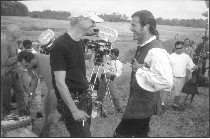|
The next scene takes place in Lord Cornwallis' dining room. For fans of Valet Number 2 (my wife, my daughters and my mother) this is the highlight of the movie. But first, there is a lot of work to be done. Lights have to be moved, both inside the building and out. The technicians move with incredible speed. Seeing what has to be done, I anticipate a leisurely lunch, but I hardly have time to gulp down my barbecued pork before we're back at work.
The scene involves Jason Isaacs (the beastly Tavington), Tom Wilkinson (the aristocratic but also fairly beastly Lord Cornwallis) and Gavin Sinclair (the handsome but silent Valet Number 2). My role is to stand behind Cornwallis as he has dinner, holding a napkin and trying not to laugh. I am aware that there is no reason for laughter. Despite His Lordship's extravagant dressing gown, this is a serious scene, full of the most dastardly dialogue. The only explanation I can find for my explosive desire to burst out into raucous guffaws is the knowledge that managing not to laugh is about my only contribution to the scene. At a certain moment, Cornwallis motions me to leave. I bow slightly and exit with dignity, wondering why so many of the crew are rolling their eyes and clasping their foreheads. Ten minutes later, with rubber attached to the soles of my shoes, we try again. This time I exit with silent dignity, concentrating so hard on not making a noise that I walk straight into a screen that is stretched in front of one of the lights. An assistant director catches me before I fall on the seat of my pristine white britches.
This is a long scene, and we shoot it many times from many different angles. This gives me an extended chance to observe two fine actors at work. There is an impressive stature and presence about them, and a seriousness about the way they approach the work. Isaacs jokes between scenes, and if he realizes he has fluffed his lines he continues for a few seconds, substituting witty gibberish for the script. But in the moment before a take, you see his brow furrow in concentration as he composes himself. Wilkinson doesn't joke. He is all concentration and when he speaks it is with a Shakespearean grandeur. Before they even start shooting, the two men have rapidly analyzed the psychology of the scene together. There is an important turning point, where Tavington realizes he has the upper hand. Isaacs proposes to empha
|
|


